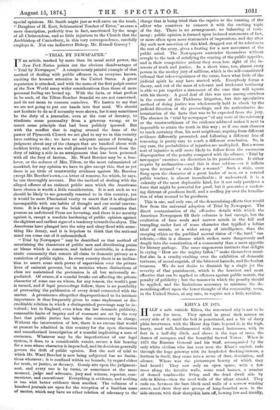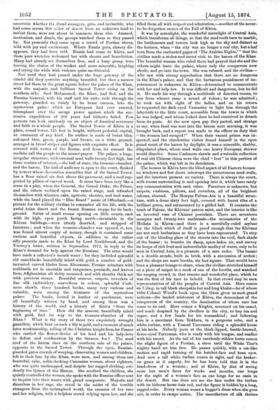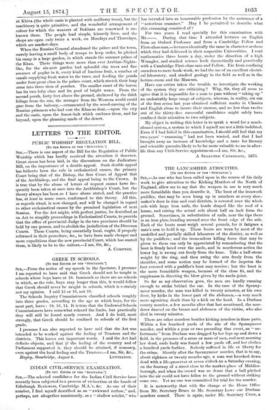KHIVA IN 1873.
HALF a mile outside Khiva, the renowned city is not to be seen for trees. They spread in great dark masses on every side of it, until the belt is penetrated, and a bit of dusty plain intervenes, with the Hazar Asp Gate beyond it, in the high, heavy, mud wall, battlemented with round buttresses, with its feet in a half-dry ditch, and above it the tops of trees, the domes of mosques, and the beautiful Sacred Tower. When in 1873 the Russian General and his Staff, accompanied by the only white civilian who has ever seen the Khan's capital, rode through the huge gateway with its loopholed flanking-towers, a fortress in itself, they came into a scene of dust, desolation, and silence. Where was the picturesque beauty of which they had heard? They saw only an open space, with a few trees along the interior walls, some mud houses, a number of domed tombs—the living and the dead dwell side by side in Khiva—then the mud walls of the silent citadeL They rode on, between the bare black mud walls of a narrow winding street, and there they saw groups of long-bearded men, in the side-streets, with their sheepskin hats off, bowing low and timidly,
uncertain whether the dread strangers, grim and invincible, who had come across 600 miles of desert from an unknown land to molest them, were not about to massacre them also. Amazed, motionless, and dumb, the groups watched them as they passed by. But presently they came upon a crowd of Persian slaves, wild with joy and excitement. Where Russia goes, slavery dis- appears, they had been told. Russia bad come to Khiva, and these poor wretches welcomed her with shouts and benediction. Many had already set themselves free, and a busy group were loosing the chains of the weaker and more miserable, laughing and crying the while with violence quite un-Oriental.
Not until they had passed under the huge gateway of the citadel did they perceive anything beautiful, but then a narrow street led them to the great square before the palace of the Khan, with the majestic and brilliant Sacred Tower rising on the southern side. Said Mohammed, the Khan, had fled, and the Russian General, with his staff and his suite, rode through the gateway, guarded so vainly by its brass cannon, into the mysterious palace which no European had ever entered, triumphant over the savage power against which the suc- cessive expeditions of 200 years had hitherto failed. Few persons can look carelessly on an object of fanatical reverence and faith to a whole people. The Sacred Tower of Khiva is a plain, round tower, 125 feet in height, without pedestal, capital, or ornament of any kind. Its surface is made of burnt tiles, coloured blue, green, purple, and brown, on a white ground, arranged in broad stripes and figures with exquisite effect. It is covered with verses of the Koran, and from its summit the mollahs call the people to the sunset prayer. The palace, a huge, irregular structure, with external mud walls twenty feet high, has three centres of interest,—the hall of state, the treasure-chamber, and the harem. The ball of audience is open to the court, flanked by towers whose decoration resembles that of the Sacred Tower, has a floor raised six feet above the pavement, and a roof sup- ported by pillars of carved wood. It must have been very like a scene in a play, when the General, the Grand Duke, the Prince, and the others reclined upon the raised stage, and refreshed themselves with wheaten cake, apricots, cherries, and iced water, while the band played the " Blue Beard " music of Offenbach,—a picture for the solitary civilian to remember all his life, with the awful Asian desert and the frozen Russian steppe for its back- ground. Suites of small rooms opening on little courts, each with its high, open porch facing north—invariable in the Khivan buildings—were utterly deserted, and stripped of furniture ; and when the treasure-chamber was opened, it, too, was found almost empty of money, though it contained some curious and beautiful objects, in addition to the rather silly presents made to the Khan by Lord Northbrook, and the Viceroy's letter, written in September, 1872, in reply to the Khan's demand for help against the Russians. The arms would have made a collector's mouth water ; for they included splendid old matchlocks beautifully inlaid with gold, a number of gold- incrusted curved blades from Khorassan, Persian scimitars with scabbards set in emeralds and turquoises, poniards, and knives from Affghanistan all richly mounted, and with sheaths thick-set with precious stones. Beautiful armour, carpets, coverlets of fine silk embroidery, marvellous in colour, splendid Cash- mere shawls, three hundred books, many very curious and valuable, were among the treasures of the mysterious palace. The books, bound in leather or parchment, were all beautifully written by hand, and among them was a history of the world, and a history of Khiva " from the beginning of time." How did the armour, beautifully inlaid with gold, find its way to the treasure-chamber of the Khan ? What is the story of those two exquisitely wrought gauntlets, which bear on each a lily in gold, and a crescent of much later workmanship, telling of the Christian knight from far France who carried the flower-device of his land and his lady-love to defeat and confiscation by the Saracen foe ? The mud roof of the harem rises on the northern side of the palace, opposite to the Sacred Tower. Through the open, Russian- guarded gates crowds of weeping, clamouring women and children, left to their fate by the Khan, were seen, and among them one beautiful, calm, noble-looking Caucasian woman, about eighteen, who was quite undismayed, and despite her ragged clothing, evi- dently the Queen of the Harem. She soothed the children, she quietly controlled the women, she spoke with the Russian officer sent to inquire into their wants with grand composure. Majestic and dauntless in her rags, she stood in the midst of the terrible strangers from the unimagined world, the enemies of her race and her religion,_ with a helpless crowd relying upon her, and she filled them all with respect and admiration,—another of the never- to-be-forgotten scenes of the Fall of Khiva.
It was by moonlight, the wonderful moonlight of Central Asia, which transforms all things, so that the mud roofs turn to marble, the battlements and towers look high as the sky and distant as the horizon, when " the city was no longer a real city, but a leaf torn from the enchanted pages of ' The Arabian Nights,' " that the civilian made a stolen and secret visit to the harem of the Khan The beautiful woman who ruled there had prayed that she and the others might leave the palace, where only the conquerors now abode, and go into the town. She was refused, and the civilian— who saw with strong approbation that there are no dungeons in the Khan's palace, and that the barbarous punishment of im- prisonment is unknown in Khiva—determined to communicate with her and help her. It was difficult and dangerous, but he did it. He made his way through a multitude of deserted rooms, to• one from whence came a sound of voices ; he was admitted he took tea with eight of the ladies, and on his return he requested the dark-eyed Caucasian to light him through the labyrinth to the little court, accessible from the tower in which: he was lodged, and whose locked door he had contrived to detach from its posts. At the now open gap they parted, and strange to say, when food was sent into the harem next morning, it was brought back, and a report was made to the officer on duty that " the women had escaped!" When their vacant prison was in- spected, and the clandestine visitor found himself in the open grand court of the harem by daylight, it was a miserable, shabby, dilapidated place, whose mud walls one heavy European shower would dissolve. Some Cashmere shawls and a valuable collection of real old Chinese china were the chief "loot" in this portion of the palace, which was left in its desolation.
The houses in Khiva have the blind aspect of all Eastern houses no windows and few doors interrupt the monotonous mud-walls,- and the interiors present no variety. There is always the court, with rooms surrounding it and opening into it, which have rarely any communication with each other. Furniture is unknown, but carpets, cushions, pillows, and coverlets, all of the brightest colours, abound. The Mosque Palvan-Ata is a beautiful struc- ture, with a dome sixty feet high, covered with burnt tiles of a brilliant green, and surmounted by a gilded ball. It contains the tomb of Palvan, the Khivans' patron saint, and the interior is like an inverted vase of Chinese porcelain. There are seventeen mosques and twenty-two medresses—the monasteries of the Mollahs in Khiva—and there is a mercifully-ruled asylum for the blind, which of itself is proof enough that the Khivans are not such barbarians as they have been represented. To step out of the blinding glare of the streets into the cool, dark shade of the bazaar ; to breathe its damp, spice-laden air, and survey its heaps of rich fruit and indescribable medley of wares, only to be seen in Central Asia, is a pleasure of a rare order. The bazaar is a double arcade, built in brick, with a succession of arches ; and the shops are mere booths, six feet square. That would have been a pleasant lounge to share, when the civilian stretched himself on a piece of carpet in a nook of one of the booths, and watched the surging crowd, in that remote and wonderful place, which he was the first of his race to behold. In that crowd may be seen representatives of all the peoples of Central Asia. Here comes an Uzbeg, in tall black sheepskin hat and long khalat—he of whose tribe Colonel Wood's book upon the Oxus gives us such grand notions--the landed aristocrat of Khiva, the descendant of the conquerors of the country, the domination of whose race has come to an end. Here comes a Kirghiz, mounted on his camel, and much despised by the dwellers in the city, to buy tea and sugar, and a few beads for his womankind ; and following him is a merchant from Bokhara, in a gorgeous robe, and a white turban, with a Yomud Turcoman riding a splendid horse at his heels. Nobody jeers at the thick-lipped, beetle-browed, fierce-eyed Turcoman, who is ready with his tongue, and readier with his sword. At the tail of his carelessly-ridden horse comes the slight figure of a Persian, a slave until the White Tzar's mighty hand set him free. He passes quickly, with a cat-like motion and rapid turning of his hatchet-face and keen eyes. And now a tall white turban comes in sight, and the looker- on gazes at it eagerly, for he has been told that it is the head-dress of a woman ; and at Khiva, by dint of seeing none but men's faces for weeks and months, one longs for the sight of a woman's face as one longs for an oasis in the desert. But one does not see the face under the turban with its hideous horse-hair veil, and the figure is hidden by a long, ragged robe. Every woman wears a beggar's dress when she goes out, in order to escape notice. The manufacture of silk thrives
at Khiva (the whole oasis is planted with mulberry trees), but the machinery is quite primitive, and the wonderful arrangement of colour for which the weavers of Bokhara are renowned is un- known there. The people lead simple, leisurely lives, and the shops are open only twice a week, on Mondays and Thursdays, which are market-days.
When the Russian General abandoned the palace and the town, merely leaving a small body of troops to keep order, he pitched his camp in a large garden, in which stands the summer palace of the Khan. There things were more than ever Arabian-Nights- like, for the six-acre garden had splendid elm trees and fine avenues of poplar in it, every kind of luscious fruit, a number of canals supplying fresh water to the trees, and feeding the ponds under four great elms in the palace dourt, which stretch their long arms into three tiers of porches. The smaller court of the harem has its two lofty elms and its pool of bright water. From the second porch, forty feet above the ground, sheltered by the thick foliage from the sun, the stranger from the Western world could gaze from the balcony,—ornamented by the wood-carving of the Russian prisoners who had cost the Khan so dear,—upon the city and the oasis, upon the forest-belt which encloses them, and far beyond, upon the gleaming sands of the desert.
































 Previous page
Previous page